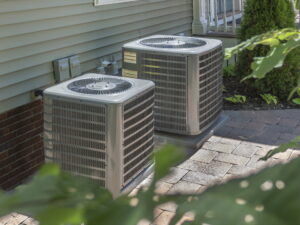When choosing how to cool your home, you have three main options: central air conditioning, window AC units, and ductless HVAC systems. Each comes with its own set of advantages and disadvantages. Here’s a breakdown to help you determine which system is the right fit for your needs.
Central Air Conditioning
Central air conditioning systems are designed to cool entire homes through a network of ducts. These systems are ideal for homes that need even, consistent cooling across multiple rooms.
Advantages:
- Even Cooling: Central AC ensures a uniform temperature throughout your home, eliminating hot spots.
- Quiet Operation: Since the main cooling unit is located outside, it generates minimal indoor noise.
- Boosts Home Value: Having central air conditioning can increase your home’s resale value.
Disadvantages:
- Higher Installation Cost: Installing ductwork, if your home doesn’t have it, can be costly.
- Energy Use: If not properly maintained, central systems can consume a lot of energy, increasing your utility bills.
Window AC Units
Window air conditioners are compact units that are installed directly into windows or a wall slot. They work best for small apartments.
Advantages:
- Affordable: Window units are usually cheaper to purchase and install compared to central air systems.
- Simple Installation: Most window units can be installed without professional help.
- Energy Efficient for Small Spaces: Window ACs can cool a single room efficiently without wasting energy on the rest of the house.
Disadvantages:
- Limited Cooling: These units are only effective in the room where they are installed.
- Noisy: Since the unit sits inside the room, window ACs tend to be noisier than central air systems.
- Aesthetic Impact: A window unit takes up window space and may not look attractive from the outside.
In general, we do not recommend using window AC units for homes. They are only suitable for small apartments.
Ductless HVAC Systems (Mini-Splits)
Ductless systems, also known as mini-splits, offer a flexible alternative to central air and window units. These systems consist of an outdoor unit and one or more indoor units that deliver cool air directly to specific zones in your home.
Advantages:
- Zone Cooling: You can set different temperatures in different rooms, which can save energy.
- No Ductwork Needed: These systems don’t require ducts, making them a great option for older homes or areas without existing ductwork.
- Energy Efficiency: The ability to cool individual rooms makes ductless systems highly energy-efficient.
Disadvantages:
- Higher Upfront Cost: Ductless systems are more expensive to purchase and install than window units, especially if you need multiple indoor units.
- Maintenance: Ductless systems require regular maintenance, including filter changes and cleaning the outdoor compressor.
Which System Is Right for You?
The best cooling system for your home depends on your specific needs. If you have a larger home and want consistent cooling, central AC is your best bet. If you prefer customizable cooling and don’t want the hassle of installing ductwork, ductless HVAC systems offer the best of both worlds. Window AC units shouldn’t even be on your shopping list if you have a home.
For homeowners looking for HVAC in Howell, MI, professional consultation is key to finding the right solution for your home.

